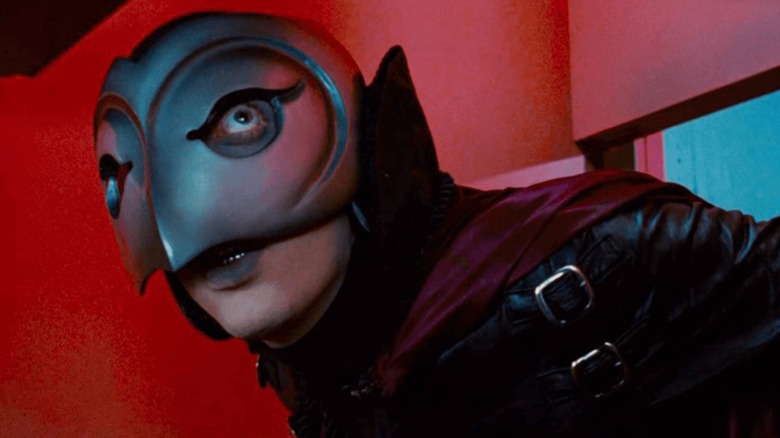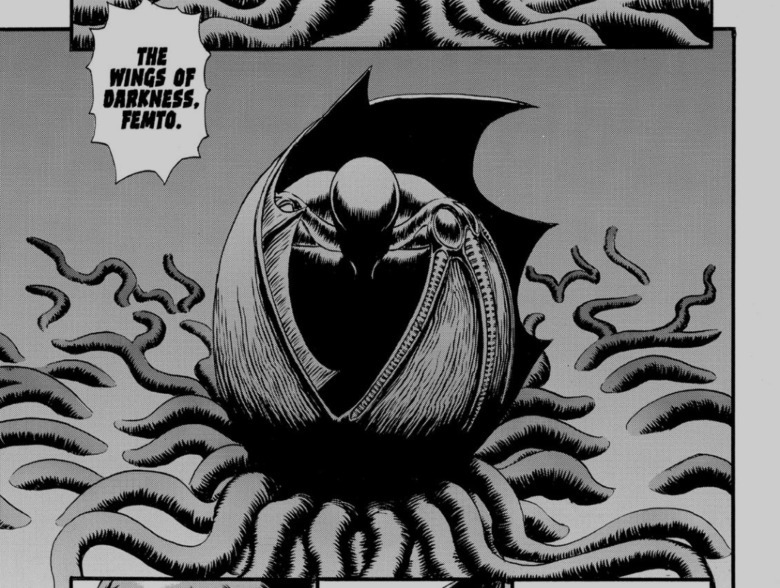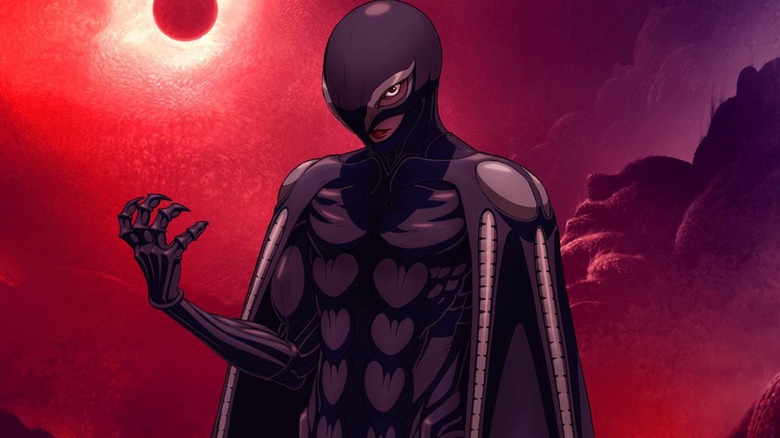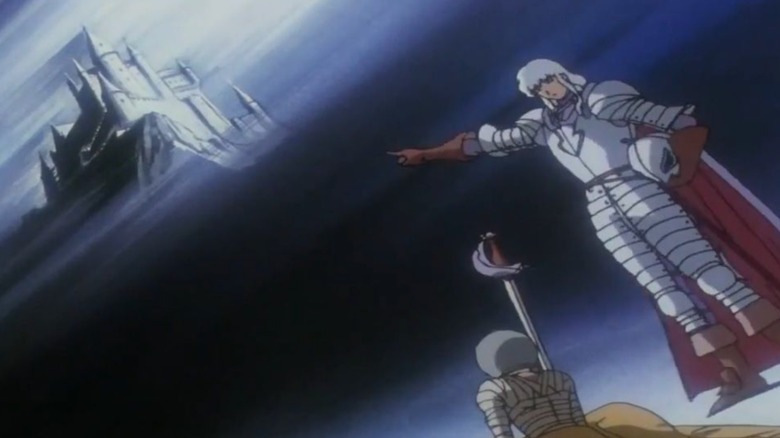A '70s Brian De Palma Thriller May Have Inspired One Of The Best Anime Villains Ever
Brian De Palma is most known for his Hitchcockian erotic thrillers, but he's not a one-trick filmmaker. In his long career reaching back to the New Hollywood era, De Palma has directed horror ("Carrie"), action-heavy crowd pleasers ("The Untouchables" and "Mission: Impossible"), and one movie that almost defies categorization: 1974's "Phantom of the Paradise."
It's a riff on "Phantom of the Opera," down to the title, as well as a horror picture, a black comedy, a satire of the music industry, and a rock opera. In "Phantom," songwriter Winslow Leach (William Finley) is suckered by sinister music producer Swan (Paul Williams, who spoke about "Phantom" with /Film here). After a string of tragedies leave Winslow destitute and disfigured, he adopts the new persona of the Phantom, clad in a black cape and cloak with a silver bird helmet. Winslow, initially out for revenge on Swan, becomes infatuated with young singer Phoenix (Jessica Harper) and saves her from Swan's talons.
Though not a success in its day, "Phantom of the Paradise" has become a cult classic with loyal fans (including /Film's BJ Colangelo). One way its legacy lives on is in the dark fantasy manga/anime "Berserk." Guts, the Black Swordsman, is a revenge-seeking warrior who fights and slays demonic Apostles, servants of the God Hand. One of the God Hand's fingers is Femto, the demonic persona of Guts' former friend Griffith. Griffith leads mercenaries called the Band of the Hawk, and was himself called the White Hawk. The avian theme continues after his corruption, for his rebirth as Femto resembles the hatching of an egg:
As Femto, Griffith is clad in black armor with a wing-like cape and a helmet resembling a bird's beak — as well as Winslow as the Phantom of the Paradise.
Berserk's Femto is a dead ringer for The Phantom of the Paradise
The late Kentaro Miura, author of "Berserk," drew on American films in his art. Miura was a "Star Wars" fan and Griffith's corruption into Femto is akin to the tragedy of Darth Vader. (Miura, though, maintained Guts' resemblance to Ash Williams in "Evil Dead" was coincidental.) While Miura did not to my knowledge outright name "Phantom" as an influence, he was asked about the film influencing his work during an interview with French publisher Glénat, and he didn't deny it.
Just look at both Winslow and Femto and the resemblance is undeniable. The texture and sheen of Femto's armor resembles the black leather of the Phantom's costume, their capes drape in the same way, and their helmets have the same pointed beak-nose. Femto's design is more inhuman, admittedly; his muscles are visible across his armor, suggesting it is not armor but flesh. His limbs have a skeletal texture, with his feet especially looking like a bird-of-prey's. His cape is also no mere cloak, but true wings that can take flight. The God Hand's designs are often compared to Clive Barker's "Hellraiser" — as Femto, Griffith is having Phantom of the Paradise, half Cenobite.
The designs aren't the only similarity berween Winslow and Griffith, either. Both men were dreamers; Winslow wanted to be a successful musician, Griffith wanted to be a king. Chasing those dreams destroyed both men, leading them to be changed into another self altogether. Griffith's complexity as a character is remarkable, but as Femto, he's all evil.
Berserk and Phantom of the Paradise both show men chasing their dreams
In "Phantom of the Paradise," Swan sends Winslow to prison, kicking off his physical misfortune, like having his teeth replaced with metal ones. He adopts the Phantom persona to hide burn scars he got from a record press. In "Berserk," Griffith — in a moment of weakness after Guts leaves the Hawks behind — sleeps with Princess Charlotte of nation Midland. For that "defilement," he's locked in a dungeon and tortured for a year; when the Hawks free Griffith, he's an emancipated shell with a slashed tongue and tendons. That weakness leaves Griffith in the right position for the God Hand's manipulation.
After "Phantom of the Opera," the other main inspiration for "Phantom of the Paradise" is the legend of Faust, the classical "man sells his soul to the Devil" story. The song Winslow writes, that Swan steals, is titled "Faust." A poster for "Phantom" boasts the tagline that "He sold his soul for rock'n'roll." Griffith's transformation into Femto is another Faustian deal, but he doesn't pay the price. Griffith doesn't have to sacrifice his own soul, but the souls of those closest to him: the Hawks. Deciding his dreams of glory must be seen through, he takes the deal, leaving the Hawks to be devoured by Apostles as the carnage fuels his rebirth into Femto.
The Phantom is a tragic figure, but he stays sympathetic to the end, and in the end dies to save Phoenix from Swan. Griffith's sacrifice and ascension to Femto, though, was an act of great selfishness. If there's one difference in their designs, note how Winslow's helmet has big and round eyes, evoking pity and suggesting innocence. Femto's helmet has eyes as sharp and predatory as, well, a hawk.



